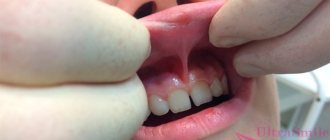Is it normal to taste salt on your lips?
Patients often ask specialists a similar question. It is worth noting that there is no definite answer to this; it all depends on specific cases. However, it is known for sure that a rare short-term sensation is not a dangerous sign .
But there are cases when a person feels this for a long time, which greatly interferes with his enjoyment of food, constantly makes him thirsty, and also makes him more irritable. Then, of course, you need to consult a specialist, because this may be a symptom of serious disturbances in the functioning of the body.
Disturbance in the functioning of the tear ducts
If a salty taste appears in your mouth, dysfunction of the tear ducts may be to blame. The natural outflow is hampered by narrowing caused by tissue inflammation or complete blockage. The causes of the pathology are mechanical damage, ophthalmological diseases or tumor formations.
Disturbances in the functioning of the channels, on the one hand, cause increased secretion of tears, and on the other hand, they cannot ensure their normal outflow. As a result, the salty liquid enters the nose, from where it flows down the back of the throat, giving a feeling of saltiness. The main danger of pathology is stagnation in the tear ducts. The secretion created creates a favorable environment for the entry of the virus, the development of bacterial infections and fungi.
Why are your lips salty?
Fortunately, such a phenomenon is not always a harbinger of any disease. If a person tastes salt, first he should make sure whether this is due to external factors.
- The simplest and most common cause of salinity is crying . At this time, tears enter the oral cavity through the nasopharynx, leaving behind an unpleasant sensation;
- Damage is also one of the most common options. When lips are chapped or bitten, a person feels blood particles forming in the cracks. It is this that contributes to the feeling of saltiness;
- Pregnancy . Women carrying a child quite often experience a phenomenon called dysgeusgia, which is accompanied by a disturbance in the perception of tastes;
- Dehydration of the body. When the human body does not receive enough moisture, it tries with all its might to show it. One of the signs is a salty taste in the mouth. It is worth remembering that a person needs to drink at least a liter or one and a half water per day. In this case, we are talking exclusively about clean water, since frequent consumption of tea, coffee, juices and carbonated drinks has a negative impact on the body and does not bring it the required amount of moisture;
- Salinity in the oral cavity is one of the indicators of poor hygiene . If a person does not provide sufficient care to his teeth, plaque begins to accumulate on them, which has a specific taste. To get rid of this, you need to pay more attention to hygiene. So, it is imperative to brush your teeth twice a day. The first is in the morning, before breakfast, and the second is in the evening, after dinner or before bed. After eating, you should use dental floss to remove any remaining food from the space between your teeth. In addition, it is important to remember that plaque remains not only on the teeth, but also on the surface of the tongue and the inside of the cheeks. It also needs to be removed using a special surface on a toothbrush;
- Salty lips can also be a side effect of taking certain medications . Most often, these are antibiotics that contain substances that act on receptors. This impact causes disturbances in his perception. To get rid of this effect, you should ask your doctor to prescribe a different medicine, except when taking anti-cancer drugs;
Diagnostics
Diagnostic methods are selected depending on the person’s concomitant health complaints. The symptoms listed above will help you understand which specialist to seek help.
To begin with, you should contact a therapist, who will suggest the further path of examination.
Important! If, during regular hygiene measures, an unpleasant odor persists in the mouth, and even more so if blood is found in the oral cavity, this is a good reason to visit the dentist.
It is necessary to exclude or confirm and treat gingivitis, periodontitis or other oral diseases.
You should also go to the dentist if your salivary glands are swollen to check whether the problem is inflammation.
Thrush that appears in the oral cavity is also diagnosed and treated by this specialist.
If you have a runny nose, cough and a constant desire to improve your throat, you should go to an ENT specialist. People turn to him for constant nasal congestion, which often indicates rhinitis.
Abdominal pain and other tastes in the mouth are a reason to consult a gastroenterologist. Most likely, gastroscopy and/or ultrasound of the abdominal organs will be prescribed.
If you have weakness, constant pallor, noise in the ears, or spots before your eyes, you need to check your blood and rule out anemia.
The doctor prescribes a general blood test and, depending on its results, additional tests to clarify the type of anemia.
Need to know! Constant headaches, vomiting, and lack of coordination accompany the occurrence of tumors and other diseases of the brain and nerves.
Therefore, in such a situation, it is better to consult a therapist, neurologist or oncologist.
The doctor will conduct tests of coordination and reflexes, and may prescribe an MRI or SCT.
Saltiness of the lips when taking medications can be prescribed in the instructions for the drug.
You can also ask the doctor who prescribed the medicine about this.
Salt on lips: reason
Unfortunately, it is not always so easy to understand why saltiness appears in the mouth. And it is not always as easy to get rid of it as in previous cases. Sometimes this feeling is a kind of cry from the body, which warns its owner about some serious illness.
- cold . Sometimes saltiness in the mouth simply means that a person has caught a viral disease or simply has a cold. Therefore, salt in the mouth is caused by a common runny nose. However, this problem should not be left unattended, and it is advisable to visit an otolaryngologist for appropriate treatment and to exclude other, more unfavorable options;
- salivary glands . It is their pathology that this sensation perhaps indicates. Salivary fluid is designed to cleanse the oral cavity of food particles and harmful microorganisms. However, if the functioning of the salivary glands is disrupted, an unpleasant effect of changing the taste in the mouth is observed. If this problem is left unattended, it can lead to serious consequences;
- Brain activity . Its violation also causes a similar effect. With various pathologies, such as tumors or epilepsy, the taste of the oral mucosa may change. But, fortunately, this phenomenon is quite rarely associated with brain disorders , especially if salinity is the only symptom.
In what cases should you consult a doctor?
Reference! A one-time sensation is possible and is not a serious signal. Particular attention should be paid if:
- When the mouth is closed, there is a feeling that the tongue is sticking to the roof of the mouth;
- Bad breath;
- Problem with chewing;
- There is itching in the mouth;
- Problem with taste perception;
Dryness in the mouth after eating with accompanying symptoms is a sign of xerotomy.
First, you need to see a therapist to get tested. After diagnosis, the doctor will send you to a specialized specialist:
- Dentist;
- Infectious disease specialist;
- Neurologist;
- Otolaryngologist;
- Gastroenterologist.
Important! If dryness is associated with nasal congestion, it is necessary to speed up recovery.
It is recommended to consult with an ENT specialist. After the examination, the doctor will prescribe treatment.
It must be remembered that if dry mouth occurs frequently, the risk of developing gum disease increases:
- Candidiasis;
- Caries;
- Tonsillitis;
- Gingivitis;
- Stomatitis
What other reasons are there?
There are also a number of rarer options that are still worth paying attention to.
- Problems with the gastrointestinal tract, such as gastritis or inflammation;
- Diabetes mellitus or various thyroid diseases;
- Psychological problems, for example, depression, nervous breakdown or neurosis;
- Uremia;
- Hypovitaminosis.
The appearance of a salty taste after eating
The salty taste remains after over-salted food, overeating, especially with the consumption of large amounts of alcohol. This is possible after drinking a large amount of strong coffee or black tea, sweet carbonated drinks or energy drinks.
It has already been mentioned that you can feel the acid from heartburn as a salty or salty-sour taste in the mouth. So the feeling of salt in the mouth after eating may be a symptom of diseases of the gastrointestinal tract with heartburn. This may be gastritis with high acidity, peptic ulcer of the stomach and duodenum, gastroesophageal reflux, diaphragmatic hernia. Consultation with a gastroenterologist with gastroesophagoscopy will help make the correct diagnosis.
We invite you to familiarize yourself with a simple way to determine the state of your health by language
Helps to eliminate reflux:
- consultation with a gastroenterologist,
- endoscopic examination of the esophagus to determine the extent of damage to the esophageal mucosa,
- esophagomanometry to determine the level of sphincter tone between the esophagus and stomach,
- impedancemetry to measure the speed of food movement in different parts of the esophagus,
- pH monitoring to measure acidity over 24 hours.
How to get rid of this?
To stop feeling salty in your mouth, and to ensure that nothing interferes with your enjoyment of your favorite foods and drinks, there are several steps you should take.
- The most important thing is to contact a specialist. Only a competent doctor will be able to find the real cause of this phenomenon and accurately determine what the root of the problem is, as well as prescribe the fastest and highest quality treatment;
- In addition, you need to take a close look at the products you consume. If fast food, spicy, fried and fatty foods predominate among them, then all this should definitely be excluded from the diet. Switching to eating healthy foods without flavorings will not only help you get rid of saltiness in your mouth, but will also have a beneficial effect on your health and quality of life;
- lovers of tea and coffee drinks will have to give them up in favor of clean water. The same should be done for those who drink a lot of juices and sodas. Fortunately, you don’t need to give up completely, but you will have to significantly reduce the number of drinks;
- pay close attention to oral hygiene.
Reason #2: bleeding gums
There is a taste of salt and you don’t know what could be causing it? The cause of this phenomenon could be bleeding gums. It could arise against the background of trauma to the mucous membrane or as a result of the development of gingivitis or periodontitis.
Blood is close in its ionic composition to sea water. It contains sodium and chloride ions, due to which people with a similar pathology experience a salty taste.
Your mouth may also feel salty due to the fact that you recently had a tooth removed. After all, after this procedure, a wound has formed, which first bleeds, and then ichor is released from it for a long time. Damaged tissues need time to heal, after which the unpleasant symptom will no longer bother you.
Inflammation and bleeding of the gums causes this problem.
Why saliva in your mouth can become salty
Nature has rewarded us with taste recipes, and this has significantly expanded our perception of the world around us. It has become a common and fashionable phenomenon to visit gastronomic tours in order to experience the flavor of exotic, specific and traditional dishes for each country. In the process of absorbing food, the variety of tastes changes and this is quite natural. What happens to the body when, quite unexpectedly, the neutral taste of saliva changes and the taste of salt is clearly felt in the mouth. Understanding that eating food has nothing to do with such a metamorphosis, a person begins to worry and look for an explanation for this unusual phenomenon.
Cracked lips, blood in the mouth
Sometimes the taste of salt on the lips is the taste of blood from microcracks. This happens with chapped, dry and bitten lips.
Dry lips often crack. The causes of dryness, in turn, are also numerous: weather, vitamin deficiency, kidney disease, diabetes, etc.
A salty taste in the mouth can also occur due to mechanical damage from mucous food, a toothpick or a brush that is too hard.
Keep in mind! Blood in the mouth also appears due to bleeding gums due to gingivitis and periodontitis.
Causes of salty saliva in the mouth - what is it connected with?
The taste of salt that appears in the mouth is not tied to any age group or location; it can appear in men and women.
The causes of the discomfort can be very different and they definitely deserve attention, analysis and, if necessary, treatment. The causes of the taste of salt in the mouth are not always pathological; they may be associated with:
- Violation of water balance. Normally, a person should drink 1.5-2 liters of clean water per day. With a lack of fluid entering the body, the structure of saliva changes. Such a change entails a change in the taste of saliva. It can be sweet, bitter, sour and often salty. The body thus signals that it is losing beneficial minerals. The phenomenon of a salty taste in the mouth is typical for people taking diuretics.
- Adverse habits (smoking, alcoholism), prolonged stay in an uncomfortable position.
- Therapy with medications. This manifestation is not the norm and more often happens as a side effect. It is worthwhile to familiarize yourself in detail with possible side effects and immediately consult a doctor.
- Malfunctions of the nervous system, stress, nervous overstrain. All actions, functions, sensations are regulated by the activity of the nervous system. Dysfunction of a physiological process or organ sends a distress signal to the brain, which in turn makes it clear that there is a problem.
- Neoplasms in the brain. Radiation therapy and chemotherapy used to fight cancer cells have powerful effects on the body. A salty taste in the mouth is not the most serious consequence after therapy.
- Poor oral care. In this case, the change in the taste of saliva is caused by the vital activity of microorganisms on the teeth, gums, tongue.
- Diseases of the nasopharynx caused by infection. A salty taste in the mouth can occur from excessive mucus accumulation in the nasal passages and nasopharynx.
- Psycho-emotional state, ophthalmological problems. Increased emotionality, blockage of tear ducts.
- Allergies. Discharge of large amounts of salty mucus.
- Hormonal changes in the body (pregnancy, menopause).
- Visiting the dentist. Painkillers, anesthesia, antiseptics affect the structure of saliva. This may be the reason for the salty taste in your mouth.
Any disease is easier to treat if all its manifestations are stopped at the initial stage. The appearance of an unnatural taste in saliva is a symptom, the cause of which is important to find out.
Other reasons
A salty taste in the mouth can be a side effect of medications - lips dry out, a coating appears on the tongue. Therefore, it is always necessary to carefully study the annotation; if unpleasant symptoms intensify, treatment should be stopped and consult a doctor.
Reasons for the taste of salt:
- stress, nervous tension - in such situations the oral mucosa dries out, coughing attacks may begin, and a salty taste appears;
- The cause of the appearance of a salty taste may be smoking, alcoholism, prolonged exposure to an uncomfortable position, severe intoxication - all these factors negatively affect brain activity, failure occurs in all systems;
- profuse lacrimation with ophthalmological problems, as a reaction to external irritants;
- pyloric dysfunction - bile enters the stomach, which leads to a bitter or salty taste after eating in the morning;
- pregnancy - often during this period, women’s sense of taste is disrupted, food seems salty, fresh, sour, against the background of hormonal imbalance, many changes occur in the body, chronic diseases worsen.
The appearance of an unpleasant salty taste in the mouth after eating unsalted food indicates a low quality product, a high content of carcinogenic substances and dyes.
When stressed, the oral mucosa dries out, resulting in an unpleasant taste in the mouth.
What does a salty taste in your mouth mean?
First of all, if the taste of saliva has changed from neutral to any other, it is necessary to exclude possible diseases. Salty lips in a person may indicate the following diseases:
- Pathological changes in the salivary glands caused by pathogenic microflora. The cause may be contact with a sick person. Bacteria, viruses, infections are transmitted by airborne droplets. It can also be a complication after pneumonia, tuberculosis, or encephalopathy. A change in taste may be accompanied by pain in the parotid, submandibular, and sublingual glands. There may be an increase in thermometer readings and swelling of the glands.
- Sinusitis, sinusitis. Colds and infectious diseases with cough and mucus discharge. The prognosis is favorable. Having cured the primary disease, the unusual taste of saliva will change to neutral.
- Pancreatitis, gastritis, peptic ulcers of the stomach, duodenum. Diseases of the digestive system. Malfunction of the pancreas, leading to a change in the acidity of gastric juice.
- Diseases of the lacrimal glands and canals.
- Food poisoning, toxicosis, diarrhea, alcoholism - everything that can lead to dehydration.
- Caries, tonsillitis, gum fistulas, periodontitis, gingivitis.
- Rhinitis, sinusitis, laryngitis, bronchitis.
- Epilepsy, ischemia, thrombosis, hypertension, stroke, atherosclerosis.
- Allergic reaction of the body.
The causes of the taste of salt in the mouth in women can be caused by hormonal changes in the body during gestation in any trimester or during menopause. During such periods, the weaker sex is haunted by non-existent odors, food preferences and tastes change. Typically, such a change is not considered a sign of pathology and goes away on its own over time, unless, of course, pregnancy has caused an exacerbation of chronic ailments.
Reason #7: dysfunction of the salivary glands
A specific taste of salt appears in the mouth as a result of the development of various diseases that damage the functionality of the salivary glands:
- Sjögren's syndrome: is an autoimmune systemic disorder of connective tissue. The disease mainly affects the lacrimal and salivary glands. The pathology can develop against the background of rheumatoid arthritis or lupus erythematosus,
- xerostomia: a condition characterized by dry mouth, which explains the presence of a salty taste in the mouth. This pathology can develop in those who take antihistamines or antidepressants, suffer from hypertension and diabetes. The disease also occurs in people who have undergone radiation therapy in the head and neck area. However, according to some studies, xerostomia most often occurs in older people. Between 10 and 60% of older people worldwide suffer from dry mouth. Moreover, the disease most often affects women 1 .
The culprit may be salivary stone disease, which is caused by blockage of the salivary glands. You can read about it in more detail in a separate article on the website, specially prepared by journalists from the portal’s editorial office.
Dry mouth causes a specific taste
The salty taste that occurs against the background of xerostomia is not dangerous in itself. But the diseases that caused it are dangerous, as well as the unpleasant consequences of dry mucous membranes. The fact is that saliva is a protector of the oral cavity from bacterial attack. Saliva also washes away food particles and helps us soften food.
But if there is not enough of it, then difficulties with swallowing food and stomach problems inevitably arise, as well as dental problems. A person with xerostomia has a high risk of rapid development of oral dysbiosis, caries, pulpitis, periodontitis, gingivitis, and stomatitis. Also, when the mucous membrane is dry, a persistent bad breath occurs.
Which doctor should I see and what tests will I take?
It is quite natural that any health-related problem leads a person to the therapist’s office. It is this doctor who performs the initial examination, describes the medical history and writes out directions for tests:
- detailed blood test;
- blood chemistry;
- general urine analysis;
- cytological examination of mucous discharge from the sinuses;
- radiography of the nasal septum;
- Ultrasound of the nasal sinuses;
- Computed tomography, MRI.
The test results will allow you to accurately determine which specialist the patient should be referred to.
Depending on which system or organ the problem is found in, the attending physician is determined. This could be: an endocrinologist, an otolaryngologist, a gastroenterologist, a dentist, a neurologist.
Preventive measures
As you know, it is better to prevent a disease than to treat it for a long time. Therefore, it is necessary to take care of your oral cavity, brush your teeth and the inside of your cheeks twice a day, use dental floss and rinse your mouth after each meal. Two or three times a week you can rinse your mouth and rinse your nasopharynx with decoctions of medicinal herbs (chamomile, yarrow sage), and also visit the dentist twice a year.
Try not to overindulge in salty and smoked foods, especially in hot weather.
Your diet should include as many fruits, vegetables, cereals and whole grain bread as possible.
The bitter-salty taste in the mouth is unpleasant. In most cases, this indicates an insufficient amount of water in the body. In this case, all fluids in the body thicken, primarily saliva and blood. Water is the main source of life, and if there is little of it, then, on the contrary, the amount of salt in the body increases sharply.
First of all, the presence of alcohol in the blood influences the appearance of a salty taste in the mouth.
In most cases, a salty taste in the mouth is not a cause of serious illness and does not have serious consequences, but in order to avoid unpleasant “surprises” you should consult a doctor.
Causes of salty taste in the mouth and methods to combat it
The causes of the unpleasant taste of salt in the mouth are varied. Some are easily remediable, while others can be the consequences of serious malfunctions in the human body. A constant specific taste on the tongue is one of the first signs of some diseases, so it cannot be ignored. If the symptom persists for a long time, you should contact a medical facility and find out why the salty taste appears in your mouth.
Why does the problem occur in men?
There is a salty taste in my mouth.
What is it and why does it occur in men? This phenomenon often occurs in athletes or people engaged in exhausting physical labor. During physical overload or training, blood pressure rises and blood flows stronger. Don't abuse alcohol
In the morning after a stormy party or get-togethers with friends, you wonder why there is a taste of salt in your mouth? The reason may lie in alcohol abuse. Don't forget that alcoholic drinks have a strong dehydrating effect. An excess of alcohol in the blood causes intoxication and dehydration of the body.
Complications of ignoring taste
Ignoring the problem leads to the development of various complications:
- There is a loss of appetite. It seems to a person that his favorite dishes have a strange, unusual taste, so he stops enjoying eating.
- Against the background of sluggish infections, a decrease in immunity occurs.
- If you delay visiting a doctor, the disease enters the chronic phase.
- Transfer of infection from the oral cavity to vital organs.
- Insomnia, aggression, developing against a background of discomfort, irritation from the constant salty taste.
- Atherosclerosis resulting from dehydration, a decrease in the elasticity of blood vessels.
Homeopathy as a treatment for salty taste
There are a number of homeopathic components, the action of which is aimed at destroying a specific taste. Various drugs effectively cope with putrefactive, bitter, sweet and metallic flavors, and also get rid of the taste of blood or unpleasant odor. You can eliminate the salty taste using the following components:
- Mercurius. Eliminates putrid, metallic, sweet and salty tastes.
- Phosphorus. The drug is indicated for sensations of sour, sweet or salty taste, especially after eating food.
- Cyclamen. Designed to combat salty taste.
- Nux vomica. It is used for pronounced metallic or salty sensations, as well as for a sulfuric taste, most often after meals or in the morning.
- Stannum is a sensation of bitter, salty or sweet in the mouth.
- Teridion - with a weak salty flavor.
- Sulfur. Eliminates salty and bitter aftertaste.
- Zinc – bloody or salty taste.
- Taraxocum - salty or sour taste sensations of any food, especially fatty and meat foods.
What exactly will help a particular patient is determined by a specialist. He will also prescribe the frequency and dosage of the drug, as well as the duration of the course of therapy.
When salty taste is treated, the prognosis is generally good. However, this is only possible with strict adherence to all specialist recommendations. You should not ignore the symptoms and self-medicate, as this can lead to serious consequences.
The feeling of a taste in the mouth is familiar to every person after eating salty or over-salted food. Although this phenomenon may be unpleasant, it is only temporary.
The situation is much worse if the salty taste remains in the mouth for a long time or is constantly present. Such sensations are unpleasant, but they may not particularly bother you.
However, often this phenomenon signals a health problem in the body, so it is best to immediately establish the cause of such a taste.
Causes of salt taste in the mouth caused by diseases
The most common causes of salt taste in the mouth are:
- Oncological diseases. The cause of a salty taste in the mouth and on the lips is often radiation therapy in tandem with chemicals used in the treatment of tumors.
- An infection that has entered the nasopharynx. Due to the accumulation of mucus in the nasal sinuses, less saliva is released, as a result, the oral mucosa constantly dries out, and the perception of taste changes.
- Salivary stone disease is dangerous due to the difficulty of diagnosis. Stones form in the saliva ducts, giving the saliva a bitter-salty taste and causing pain during swallowing. With the disease, the process of salivation is disrupted.
- Pathologies of the nervous system. A change in taste sensations in the oral cavity is a sign of a failure in the transmission of signals from nerve endings to the brain. Brain activity disorders associated with epilepsy, stroke, hypertension, atherosclerosis, ischemia, although rare, are manifested by altered taste perception, and therefore an increase in the salt balance in the oral cavity.
- Allergies accompanied by incessant coughing and sneezing with salty sputum.
- Inflammation of the glands responsible for the secretion of saliva: infections of bacterial origin (strepto-pneumo-staphylococci), sialadenitis, Sjogren's syndrome. Inflammatory processes affect the quality and quantity of saliva constantly secreted by the glands.
- Diseases of the nasopharynx. Sinusitis, which develops as a result of advanced colds, affects the mucous membrane of the sinuses. The secretory fluid, flowing from the nasal reservoirs, flows down the wall of the throat, which is why an unpleasant salty taste appears and patients cease to smell. Sinusitis - inflammation of the maxillary sinuses - is accompanied by a salty taste on the tongue and lips for the same reasons.
- Diseases accompanied by a debilitating cough. The mucus produced when coughing has a salty taste.
- Pancreatitis, a disorder of the functionality of the pancreas and gastrointestinal tract. As a result of improper functioning of the pancreas, the amount and composition of gastric juice changes, which is why saltiness appears on the tongue and lips.
Reason #4: Dehydration
If you have a salty taste in your mouth, then it’s time to calculate how much clean water you drink per day. Because it is the imbalance of fluid in the body that often becomes the answer to the question of why the salty taste bothers us. Our saliva contains sodium chloride, in other words, it is ordinary salt.
When fluid is lost in the body, blood and saliva thicken, causing dry mouth. Saliva undergoes a process of dehydration, causing it to contain more salt and less liquid and other useful minerals. The more severe the dehydration, the more clearly the unpleasant symptom appears.
The cause of dehydration could be a low-carbohydrate diet, taking diuretics, poisoning and indigestion, drinking alcoholic beverages, drinking too much strong coffee or soda, or smoking a large number of cigarettes. Dehydration can develop during intense physical activity, after spending a long time in the scorching sun or in hot, stuffy rooms.
An imbalance of fluid in the body often causes a bothersome salty taste.
When dehydrated, the taste of salt may be accompanied by other alarming symptoms: weakness, dizziness, thirst, rare urination, diarrhea. The first thing to do in such a condition is to drink as much liquid as possible, in particular clean water.
It’s better to generally make it a rule to drink at least one and a half or two liters of water a day every day. This is approximately 8 glasses. However, in cases where the body suffers from dehydration, this figure can be safely increased. For example, lovers of strong coffee drinks who drink up to 5 mugs of coffee a day should regulate the balance of healthy fluids in the body by taking 2-3 glasses of clean water more than those who are not fond of coffee.
Causes not related to diseases
The taste of salt in the mouth may be due to the following factors:
- Dehydration. When drinking less than two liters of liquid per day, the water-salt balance in the body is disrupted. The composition of saliva changes significantly, causing dryness and a salty taste in the mouth (less often, a sweet or sour taste appears). Dehydration occurs during vomiting, diarrhea, and the use of extreme methods for losing weight.
- Exposure to medications and anesthesia used before and after tooth extraction changes the acidic environment around the gums, which can cause a salty taste in the mouth.
- Insufficient oral care. The appearance of a tasteless salt sensation is a possible sign of the proliferation of harmful microorganisms. Bacteria attack tooth enamel, contribute to the development of caries, and the appearance of tartar. As bacteria multiply, they infect the salivary glands, which means they change the taste of saliva from neutral to salty.
- Salty tears that enter the nasopharynx and leave a corresponding aftertaste. Excessive lacrimation can be associated both with a person’s emotional state and with a reaction to dust, bright snow, gusts of wind, sun or allergies.
Common side effects of some medications include a salty taste and dry lips. After taking medications with a diuretic effect, dehydration may occur, which also explains the appearance of salty saliva.
Reason No. 3: abuse of salty foods
Why are your lips salty and your mouth taste like salt? The most common reason is that you ate salty food. Remember that salt in large quantities is harmful to the body, it negatively affects the cardiovascular system, kidneys and liver, stomach, retains fluid in the tissues, and at the same time contributes to poor absorption of calcium, which is so beneficial for our teeth and bones. Salt accelerates the aging of the body and impairs the functioning of blood vessels.
As an alternative to this product, scientists advise adding healthy and safe natural substitutes to your food - celery, herbs and seasonings, garlic, dried seaweed. To preserve the salts found in natural foods, it is recommended to steam them rather than fry or boil them.
Excessive salt intake can leave a taste on the lips and tongue
A scientist from Maine actually proposed an alternative way to salt food - special cutlery that, touching the tongue, produces impulses. Thanks to this, a person has the feeling that he has eaten rich food. Scientists at the University of Tokyo have also developed a three-mode electric plug that can imitate the taste of salt.
Why does the taste of salt appear in the mouth of women and men?
The cause of a salty taste in the mouth in women is most often pregnancy. The raging restructuring of hormones in the body of the expectant mother causes all possible taste changes. Strange tastes of pregnant women, the desire to eat salty foods is not a lady’s whim at all, but a violation of taste perception or dysgeusia. While carrying a child, a woman’s receptor sensitivity increases, which makes food seem bland to her. A salty taste in the mouth also provokes constant toxicosis.
In men, a salty taste in the mouth is caused by drinking large amounts of alcohol. Excessive intake of alcohol-containing products provokes dehydration, due to which men experience an unpleasant salty taste in the mouth.
Infectious processes, rhinitis
The taste of salt on the lips and mouth can be caused by an infection in the body. Most often these are infections in the sinuses.
As a result of inflammatory processes in the sinuses, mucus of a salty taste appears, it descends along the back wall of the throat into the oral cavity and causes this symptom.
We invite you to familiarize yourself with the methods and prognosis for treating narrowing of the jaws and dentition
The same mechanism for the occurrence of a salty taste during rhinitis, when mucus accumulates in the nasal sinuses and flows down the throat.
A similar picture can occur in people with a deviated nasal septum and similar pathologies.
One of the infections that causes saltiness on the lips is thrush. Its other obvious sign is whitish spots in the mouth. It can also cause a metallic and bitter taste.
Elimination of salty taste and treatment of the disease that caused it
- The salty taste caused by the medication disappears after the course of treatment is completed. In case of severe discomfort, you should undergo examination and change medications.
- It is easy to remove the feeling of salt caused by poor hygiene with the help of thorough brushing of the teeth, thorough rinsing of the mouth, and additional irrigation of the oral cavity with special means: balms, sprays, solutions.
- Excessive consumption of alcoholic beverages by a person can cause intoxication of the body, which the pancreas cannot cope with. This condition can be eliminated by replenishing the fluid supply. You should drink regular or mineral water.
If the reason for the feeling of salt on the lips lies in dehydration, then the patient needs to drink more liquid, preferably regular drinking water. Drinks that remove fluid from the body - coffee, alcohol - should be excluded from the diet.
Self-medication is dangerous; all medications (tablets, sprays, ointments) must be taken as prescribed by a doctor.
Reason #6: ENT diseases
The salty taste sometimes has rather trivial causes: for example, bacterial sinusitis, allergic rhinitis, tonsillitis, pharyngitis, sinusitis or a cold. During inflammation, mucus appears in the sinuses, which consists of mucin protein, salt, nucleic acids and water. In the acute course of the disease, snot flows down the walls of the nasopharynx into the throat, and accordingly, a feeling of salt occurs. With sluggish inflammation of the ENT organs, mucus is also constantly disturbing by its appearance in the mouth.
ENT diseases also contribute to the appearance of a salty taste
Prevention of discomfort
In order to prevent the occurrence of a salty taste, you should:
- Visit the dentist at least once every six months.
- Maintain a drinking regime to maintain water-salt balance.
- Adhere to a healthy diet, give preference to environmentally friendly products.
- Maintain normal stress tolerance.
- Take good care of your teeth and oral cavity.
- Undergo medical examinations in a timely manner to identify diseases that cause a salty taste in the mouth.
Taking medications
You should know! Some medications block taste buds and distort the sense of taste. This results in a salty taste in the mouth and lips.
Often salinity appears due to antibiotics and anti-cancer drugs.
We invite you to familiarize yourself with the Anatomy of the canine of the upper jaw - Dentist's Journal
Oral contraceptives and drugs for the treatment of high blood pressure do not distort the sense of taste, but they cause the aforementioned flow of mucus down the throat.
The result is the same - salty mucus in the mouth and a taste on the lips.











